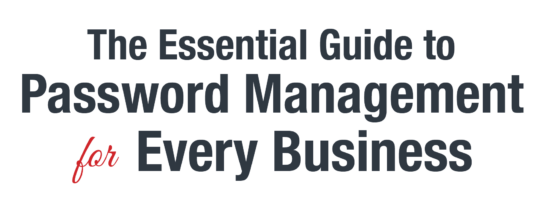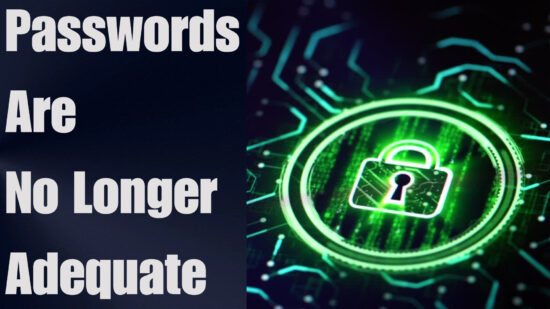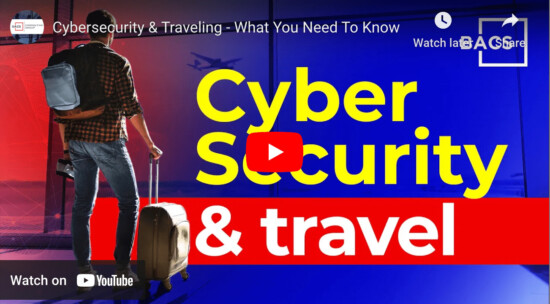Why Passwords Are No Longer Adequate: Passphrases, Management & BACS in Corporate IT Security
Your company’s IT security should be a top priority in today’s rapidly evolving cyber world. Standard passwords have long been the default choice for protecting sensitive information and systems, but they may no longer be adequate to safeguard against sophisticated cyber threats. Passphrases have emerged as a more secure and user-friendly alternative, providing an extra defense against unauthorized access and potential data breaches.
As you transition to this new approach, embracing passphrases as the norm for password management can bring multiple benefits. Thanks to their length and combination of words, they are more memorable and harder for attackers to crack. NIST guidelines even recommend using passphrases of at least eight characters, as they offer better security than traditional passwords with complex requirements.
One way to further bolster your corporate IT security is implementing a Business Authentication and Credentialing System (BACS). This comprehensive approach to safeguarding your digital assets goes beyond mere password protection, incorporating multi-factor authentication, biometric verification, and more to create a robust line of defense. By adopting BACS and passphrases, you can help secure your organization from the ever-growing risk of cyber breaches.
The Inadequacy of Traditional Passwords for Corporate IT Security
Password Complexity vs. Length
Many people believe that password complexity is the key to security. However, a more secure approach is to focus on password length. A longer password with a mix of characters, numbers, and symbols is more complex for hackers to crack and offers greater entropy. NIST’s password recommendations emphasize length over complexity, and Microsoft has echoed this view in their recent authentication policy updates.
Brute Force and Dictionary Attacks
Traditional password complexity requirements, such as uppercase and lowercase letters, numbers, and special characters, have not deterred hackers. Brute force and dictionary attacks are standard methods of cracking passwords. Brute force attacks involve guessing every possible combination of characters until the correct one is found, whereas dictionary attacks use precompiled lists of words to make educated guesses. Longer passwords can better withstand these attacks, as the number of possible combinations increases exponentially with each added character.
Human Error and Password Practices
Cybersecurity is heavily influenced by human error and password practices. Common mistakes include reusing the same password across multiple accounts, sharing passwords, and writing them down to remember. Inadequate password management can lead to data breaches and identity theft.
Passphrases are becoming an acceptable norm in password management to reduce the likelihood of human error. Passphrases consist of a series of words or phrases, making them easier to remember and reducing the need for password changes. They also tend to be longer, offering better resistance to brute force and dictionary attacks.
In summary, traditional passwords may no longer provide adequate protection in the rapidly changing landscape of corporate IT security. By adopting passphrases and focusing on password length rather than complexity, you can better safeguard your organization from cyber threats like brute force, dictionary attacks, and human error.
The Rise of Passphrases as a Secure Alternative
Advantages of Passphrases over Passwords
Traditional passwords often fall short in the ever-evolving world of corporate IT security. Passphrases have emerged as a more secure alternative to help protect your company’s sensitive information. Unlike passwords, which tend to be shorter and easier to crack, passphrases offer increased security due to their length, often exceeding 14 characters. Combining unrelated words makes it even harder for hackers to guess, providing an extra layer of protection.
In addition to being more challenging to crack, passphrases often prove easier to remember for users. This decreases the reliance on writing down passwords and reduces the risk of unauthorized access. Moreover, as many websites now accept passphrases up to 64 characters, this affords a more significant opportunity for creating unique and secure authentication methods.
Creating Strong and Memorable Passphrases
To create a strong and memorable passphrase, it’s essential to choose words that aren’t easily guessed but still hold personal meaning for you. Avoid using common phrases or quotations from popular culture. Instead, create individual, distinctive combinations incorporating a mix of alphabetic and non-alphabetic characters.
When possible, incorporate multi-factor authentication (MFA) to enhance security further. Combining something you know (your passphrase) with something you have (a physical token) or something you are (biometrics) makes it considerably more difficult for cybercriminals to breach your account.
Password Managers and Passphrases
Password managers, such as BACS, can help you securely store and manage your passphrases across various platforms. These tools make it easy to generate and keep track of unique passwords for each account, eliminating the temptation to reuse one across multiple sites—a common weak point in IT security.
Integrating a password manager with your passphrase strategy strengthens your organization’s security posture while ensuring a user-friendly experience. Select a reputable password manager with robust security features and supports passphrases as an authentication method.
In an age where cyber threats constantly evolve, it’s crucial to stay one step ahead by embracing passphrases as a secure alternative to traditional passwords. Implementing this approach and following best practices protect your company’s data and minimize the risk of crippling cyber breaches.
Implementing a Better Access Control Security System
Securing Corporate IT Environments with Multi-factor Authentication
Moving beyond relying on traditional, single-factor password authentication is essential to secure your corporate IT environments. Implementing multi-factor authentication (MFA) in your organization dramatically reduces the risk of cyberattacks by requiring users to provide at least two forms of authentication to access the system. With MFA, even if a hacker manages to steal a user’s password, they still won’t gain access without the second form of authentication, providing an additional layer of security.
Role of Password Managers
Password managers are essential to managing passwords across multiple websites and applications securely. Using a password manager, your employees can create randomly generated, complex passwords for each account without worrying about remembering them all. Instead, the password manager will store and encrypt these passwords, which can be accessed using a single passphrase. This significantly reduces the risk of human error and the possibility of password guessing or brute force attacks.
Educating Employees on Cybersecurity Best Practices
Equipping your employees with cybersecurity best practices is crucial in mitigating the risk of cyber breaches. Begin by encouraging the use of passphrases instead of single-word, easy-to-guess passwords. Passphrases are strings of multiple words and should ideally be at least 15 characters long. They are more difficult to crack due to their increased length and randomness, substantially reducing the chance of successful password guessing or brute force attacks.
Ensure employees follow proper password guidelines, such as ensuring their passwords contain a mix of uppercase and lowercase letters, numbers, and symbols. Further, advise them against using easily guessable personal information in their passwords. Establishing a firm password policy within your organization would be best, outlining requirements for password strength, expiration, and rotation.
Regularly educate your employees on the latest cybersecurity threats and best practices, such as being cautious of phishing emails, avoiding public Wi-Fi without a VPN, and keeping software up-to-date.
Strengthening your organization’s access control security is essential to protect sensitive data and prevent cyberattacks. By implementing multi-factor authentication, utilizing password managers, and educating your employees on cybersecurity best practices, you will significantly reduce the risk of cyber breaches and help ensure the safety of your corporate IT environment.
How BACS Consulting Group Provides Robust Corporate IT Security Services
In today’s complex digital landscape, ensuring the security of your corporate data and systems is essential. Traditional passwords may no longer be adequate for protecting your organization against cyber threats. BACS Consulting Group can help you move beyond passwords and build a comprehensive IT security strategy that includes passphrases and other robust security measures.
You can use their expertise in IT Managed Services, IT Consulting, and IT Security Solutions by partnering with BACS. They focus on enhancing the end-user experience while securing your organization’s assets. BACS understands the importance of password security and protection and will work with your team to implement effective strategies.
To begin with, they will ensure that your organization is following best practices for password management. This includes implementing measures to block weak passwords, repetitive variants, and any terms that might be easy for hackers to guess. Additionally, BACS promotes the use of passphrases, which are longer and more complex, making them significantly more secure than traditional passwords.
Outside the realm of passwords and passphrases, BACS also provides comprehensive cyber-defense services. Their experts will analyze your organization’s current security posture, identify vulnerabilities, and recommend solutions to mitigate risks. This may involve implementing advanced security technologies, such as intrusion detection and prevention systems, which can help identify and respond to threats in real time.
Furthermore, BACS ensures your organization stays updated with emerging security threats and trends. They constantly monitor the cybersecurity landscape, allowing them to develop cutting-edge solutions that protect your valuable corporate data.
By trusting BACS Consulting Group with your corporate IT security needs, you can be confident that your organization is protected with state-of-the-art solutions. Their expert team will work closely with you to provide the highest cybersecurity services, so you can focus on growing your business with peace of mind.







